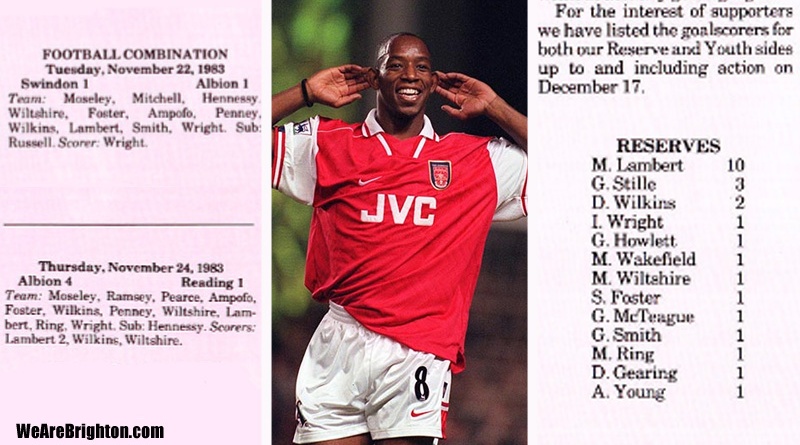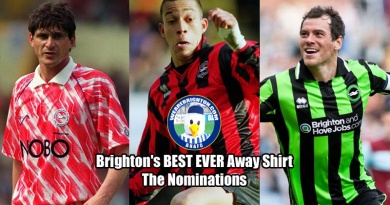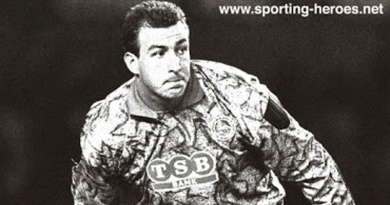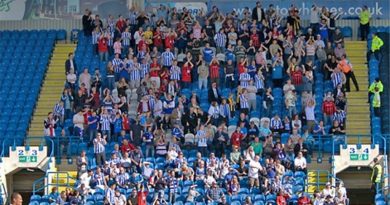The story of Ian Wright and his Brighton trial
Ian Wright Wright Wright. One of the greatest goalscorers of his generation with 323 goals in 627 appearances. A man who played 33 times for England. An Arsenal legend. A player who is popular with football fans across the country for always playing with a smile on his face and never giving less than 100%. And a man who was turned down by Brighton.
The Albion have a long and glorious history of rejecting players who would go onto become superstars. Roy Keane came on trial at the Goldstone but was deemed to be too small.
Martin Hinshelwood had a choice between signing a young defender on-loan from Arsenal called Kolo Toure or bringing in a rotund, 33-year-old Guy Butters. That went well. And Wright wasn’t offered a contract despite having a six week trial. Another fine decision.
Wright had rocked up at the Goldstone as a 19-year-old in the autumn of 1983. He’d been recommended to Albion boss Chris Cattlin by George Petchey, recently appointed as Brighton’s Youth Development Officer and who had first come across Wright when he was manager of Millwall between 1978 and 1980.
Wright had trained with the Lions as a schoolboy, with Petchey describing him as “One of the kids who was knocking about there.”
If that sounds disrespectful, then it almost certainly isn’t meant to be when you look at who else Wright was playing alongside – players such as the Wallace Brothers, Neil Ruddock, Keith Stevens and Kevin O’Callaghan.
He was never taken on properly by Millwall though due to some discipline issues. Petchey later said, “When I saw him play at Millwall, I thought he would have stayed there and done ever so well.”
“But unfortunately, he got into a bit of trouble with one or two others – they were all bloody stupid there at the time, there was a lot of indiscipline.”
Bloody stupid he may have been, but Petchey still felt that Wright could make it as a professional, hence his suggestion to Cattlin that he take a look. And so, the forward was granted a trial with the club.
Wright made two appearances in Brighton colours for the Reserves. The first of those came on Tuesday 22nd November 1983 against Swindon Town in a 1-1 draw.
Needless to say, he scored and it was a trademark goal too as he outpaced everyone down the left hand flank before cracking one in. Nobody who saw the finish could have failed to be impressed. Two days later and Wright was part of the Brighton team who defeated Reading 4-1.
He was also banging them in training against the first team by all accounts. One player who certainly took a shine to him was captain Steve Foster, who was going through problems of his own after falling out with Cattlin.
Both manager and skipper were strong personalities and that led to clashes almost from the moment that Cattlin was appointed in October 1984.
Foster was also struggling with injury. He’d been on the sidelines for two months when Wright first arrived on trial, meaning that the two would end up playing in the same reserve side as Foster battled his way back to full fitness and Wright fought for a contract.
Speaking to the Players Tribune last year, Wright recalls how Foster stood up for him as he attempted to recoup some expenses to pay for a train fare to London.
On his day off, Wright wanted to pop back to see his family. Some of the Albion players let him know that he could claim the money back from the club; all he had to do was speak to a lady in the offices at the ground.
Wright did just that and was told that he just needed to wait a minute. Five hours later and he was still waiting. At that point, Foster turned up and asked Wright what he was doing.
When Wright told Foster that he’d been waiting five hours for some money to travel home and visit his family, the Brighton captain went mad.
According to Wright, Foster breezed into the office and began shouting “How can you do this? This poor boy’s been waiting.” A few minutes later, Foster and the lady in question came out and Wright got £200 in cash.
He thanked Foster, got on a bus and then burst into tears. It’s a story that doesn’t exactly cover the Albion in glory, but worse was to come when Wright was told that he wouldn’t be getting a contract with the club.
Because he wasn’t even told. Not by Cattlin anyway, the man who had made the decision shirking the responsibility of delivering the bad news to the teenager.
Instead, the Albion told Tony Davis, Wright’s manager at non-league club Ten-Em-Bee, that they weren’t interested. It was down Davis to pass on the bad news. Classy.
Wright never got told why he’d been released either. As a result, many theories have done the rounds in the subsequent years. Did the Albion not like his attitude? Wright says he was there on time every day and tried to be the ultimate professional.
Was it because of his height, the same fateful reasoning that was behind the decision not to sign Keane several years later? Wright was small, but having grown up with a step-dad who he describes as “a weed-smoking, gambling, coming-home-late, gambling-his-wages, womanising kind of guy who was rough with my mum and rough with all of us kids”, had made him a tough and determined individual. What he lacked in height he more than made up for in fight.
Petchey meanwhile put it down to the number of strikers that the Albion had on the books at the time. The most likely reasoning however is that Cattlin rated another young player that the club had on trial more highly – a certain Steve Penney.
Penney had come to Sussex from Northern Ireland amateur side Ballymena United and like Wright, he played in those two reserve team games against Swindon and Reading.
Two days after the win over the Royals and he was pitched in for his league debut, starting in a 3-1 defeat away at Barnsley. Cattlin had seemingly decided that paying £10,000 for Penney’s services was a better investment that handing a contract to Wright.
In Cattlin’s defence, Penney did go onto have an excellent career with the Albion. He played 162 times over the next eight years, scoring 15 goals from the left wing.
He went to the 1986 World Cup with Northern Ireland and held a club record as the player to win the most international caps while on the Albion’s books up until last October when Shane Duffy overtook him. Had it not been for persistent knee injuries, then Penney could have had an even more distinguished career at the Goldstone.
And speaking of distinguished careers, Wright didn’t do too badly either, did he? A year after the kick in the bollocks of being told that he wasn’t wanted at the Goldstone, he went on trial with Crystal Palace.
Steve Coppell could see what Cattlin couldn’t and offered him an initial three month contract. Wright ended up staying at Selhurst Park for six years, scoring 117 goals in 277 games. From there, he became Arsenal’s greatest ever goal scorer until his 185 goals in Gunners colours were eclipsed by Thierry Henry.
It was quite a rise for a player who was still playing non-league at 22. And it’s Wright’s journey to the very top of the game which is why he is such a popular figure with football fans – no matter who they support.
By rights, Brighton fans should hate him. After all, Mark Bright is detested for his role in firing Palace to one of the most successful periods in their history.
But there’s just something about Wright, his story, his character and him as a person that makes him instantly likeable. Even for a Palace player.
Just imagine if he’d instead played for Brighton.




